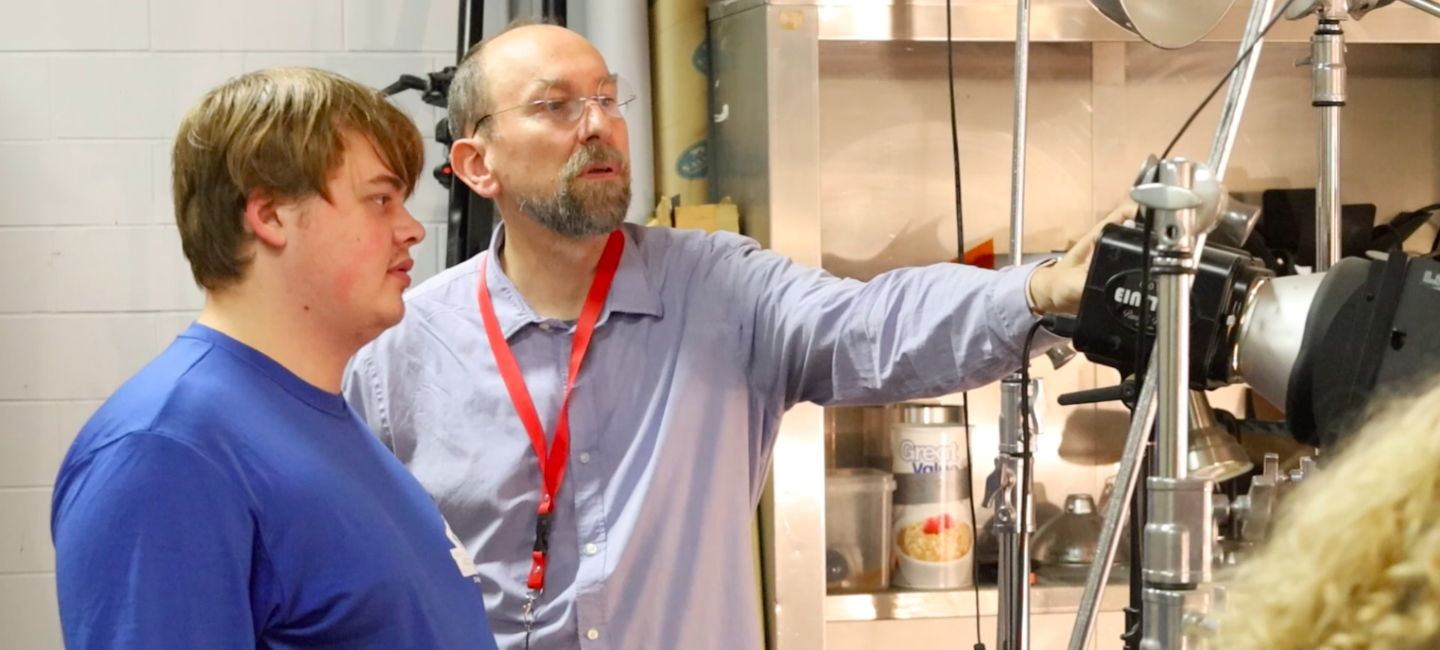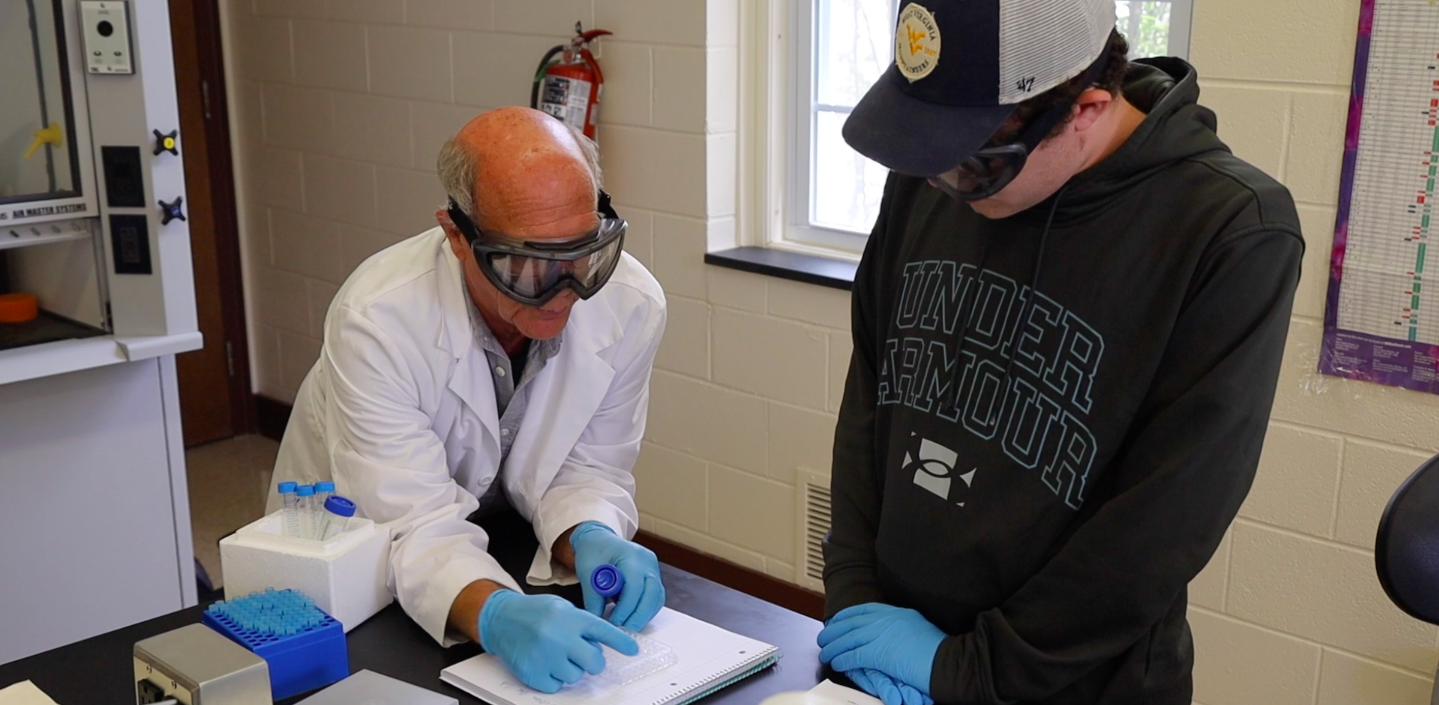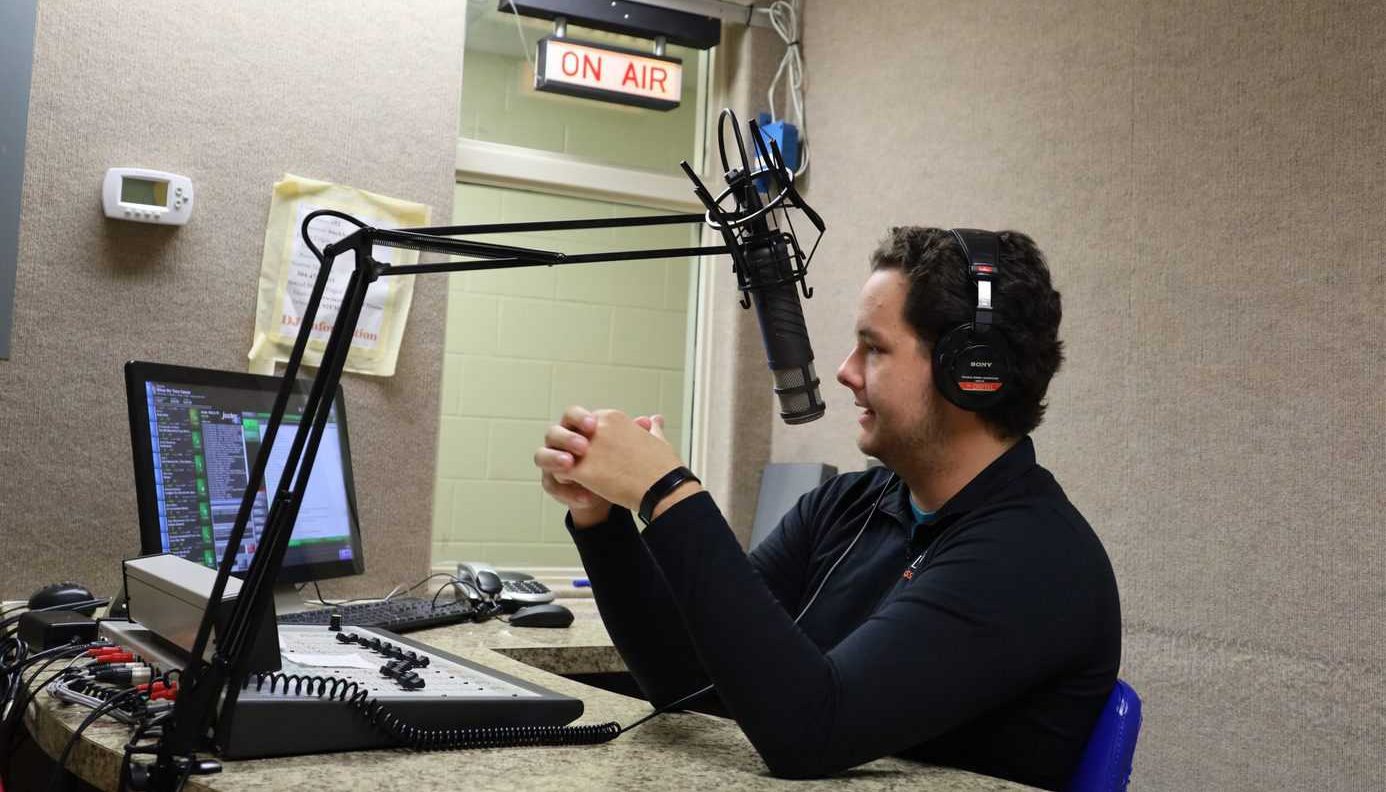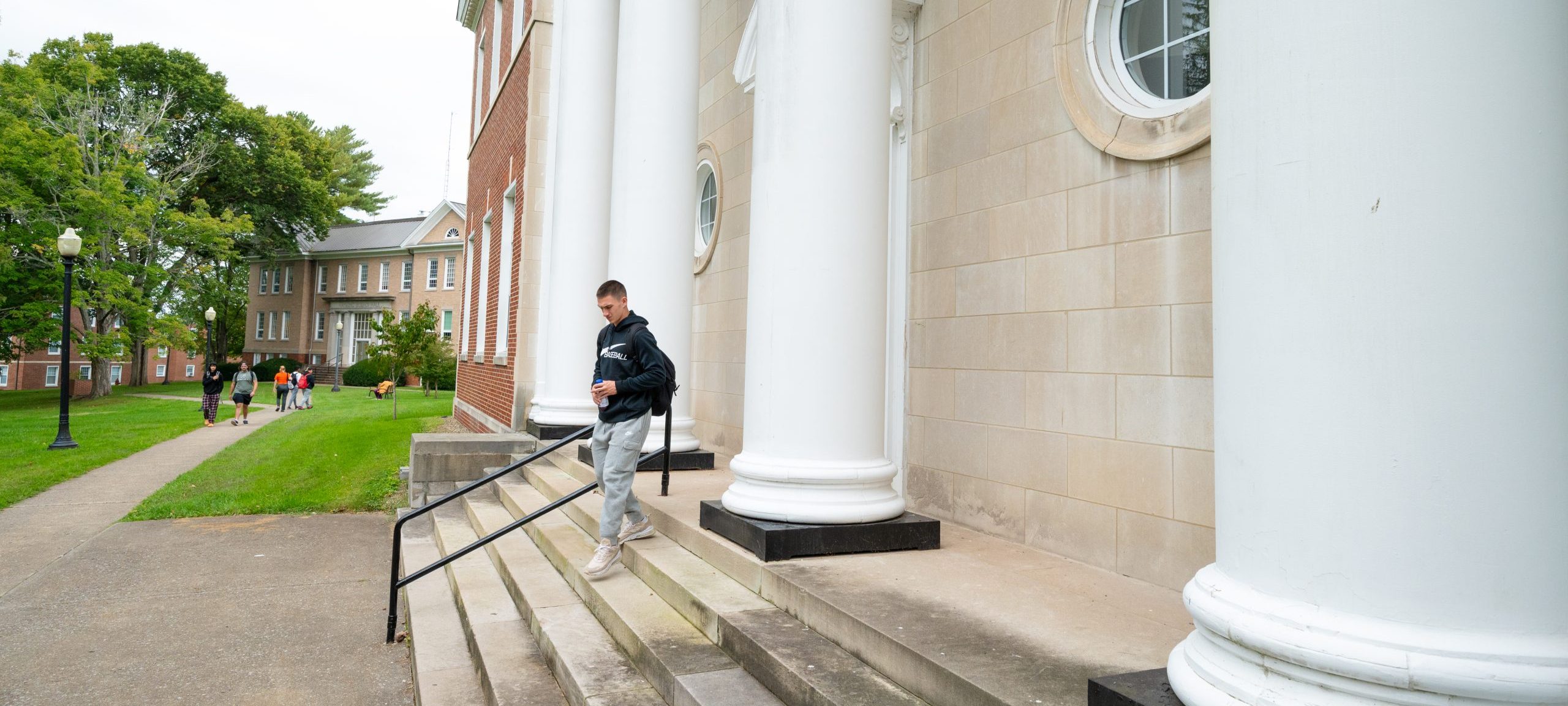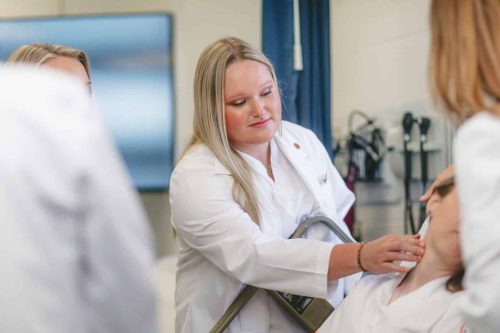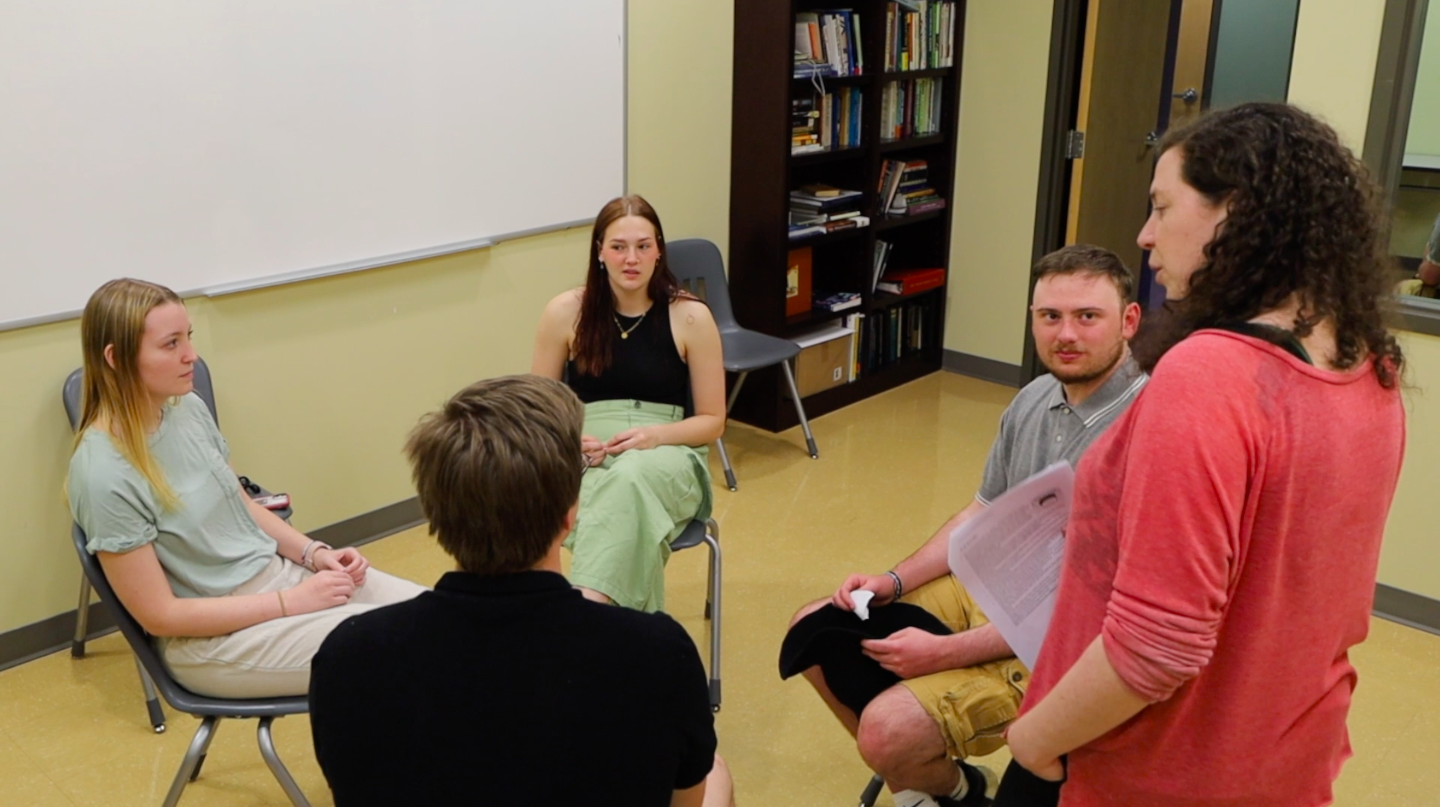护理
学院和学习项目
The personal attention our students receive has an undeniable impact on their outcomes. 小班授课,师生比例为13:1,营造出亲密的氛围, caring learning environment that produces an impressive number of Fulbright Scholars and other notable academic achievements.
学生们学习严格的课程, 是什么让毕业生进入这个行业更安全, 具有批判性思维的熟练从业者, 有效的沟通, 也是护理加拿大28网址学习的基础.
护理学院的使命是提供可访问的, high-quality nursing education to a diverse group of undergraduate and graduate students, 准备他们是反思的医疗保健领导者和学者能够应对日益复杂的医疗保健系统. 这一使命将通过提供创新来完成, 满足社会需要的护理教育课程,并结合最佳实践证据和当代护理科学. 使命的基本信念, 发展, and arrangement of the curriculum include: an understanding of the fundamental dignity of human beings, 护理学的本质是科学, 艺术, 以及为人类服务这一学科的关怀本质, the perspective of health as a dynamic entity varying with time and life circumstances, 以及终身教育的过程.
护理学的本科和加拿大28网址学习使妇女和男子能够通过文化敏感的方式促进人类在不同人群的护理中茁壮成长, 循证实践. 人们赋予知识的独特意义, 语言, 行为影响护理实践. 人们在与个人的伙伴关系中蓬勃发展, 家庭, 社区, 以及尊重他人尊严和独特性的人群, 认识到每个人的优雅和赋权的能力.


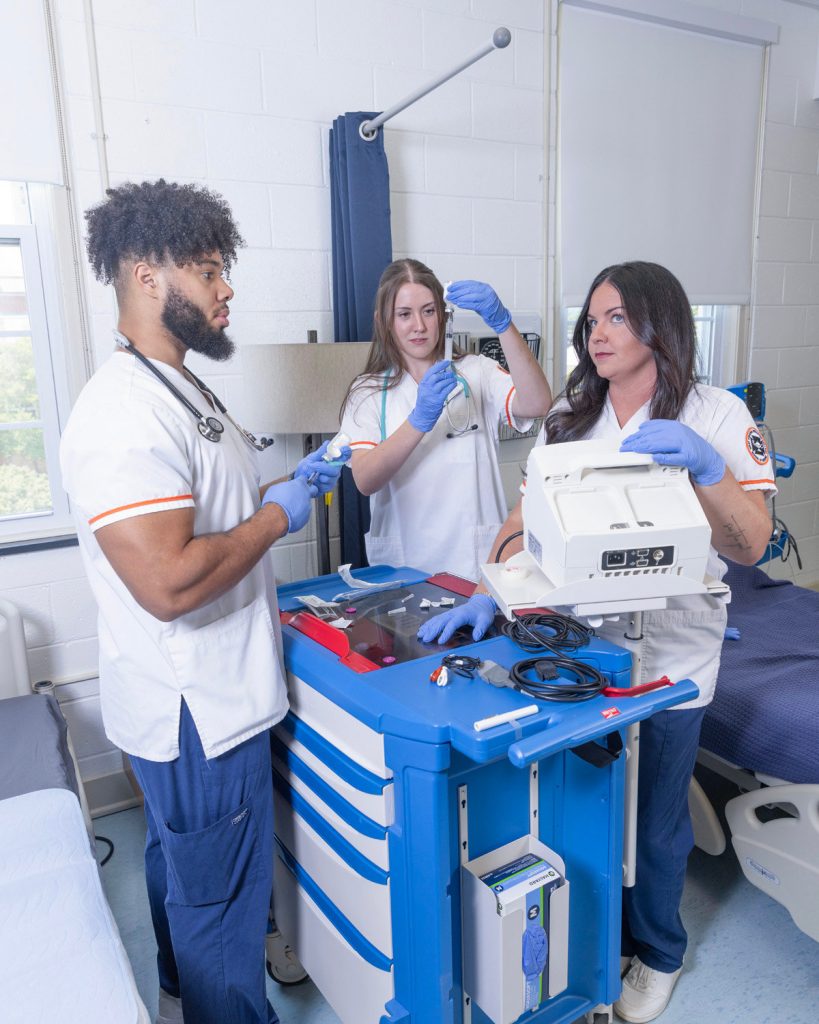
-
男女学者计划
The 男女学者计划 provides Scholarship assistance offered to School of 护理 programs
和他们的护理系学生
之后在Mon卫生系统工作
完成学位.需求
要申请Mon学者项目
申请人必须具备:- 累计2.0的绩点
- 如果学生的大学课程少于12学分,高中GPA为3分.0是必需的
居住在华盛顿州、马里兰州、俄亥俄州或宾夕法尼亚州 - 被WVWC护理学院录取
应用
完成在线Mon Scholar申请
可以在: 男女学者计划提交你收到的录取通知书
WVWC护理学院.问题? 联系
Recruitment@monhealthsys.org -
项目的目标
西弗吉尼亚卫斯理护理学院的目标反映了该计划的总体使命,即提高所有人的健康和生活质量.
+ Develop academic programs that meet the needs of society and incorporate best practices in nursing education.
+提供支持, 学院环境,鼓励卓越的教与学, 专业发展, 以及教师/学生奖学金.
+培养能够改善临床实践结果的领导者, 卫生政策, 以及护理提供方法.
+准备毕业生能够提供安全, 以证据为基础的, culturally-competent, patient-centered care that reflects ethical 临床判断 and interprofessional collaboration.
培养学生求知欲和求知欲.
-
Mon健康护理研究员
-
RN转MSN
点击 在这里 了解更多信息.
Tina Straight, DNP, MSN编辑. CNE,注册护士,护理学院院长,副教授
办公室:米德尔顿大厅
电话:304-473-8504
电子邮件:straight_t@yogaintheusa.com
Amy Coffman, DNP, MSN, APRN-BC, FNP, Director, 加拿大28网址课程 and Associate Professor
办公室:米德尔顿大厅
电话:304-473-8227
电子邮件:coffman_a@yogaintheusa.com
Shannon Bosley, DNP, MSN,注册会计师,助理教授,仿真主任
办公室:米德尔顿大厅120
电话:304-473-8221
电子邮件:bosley_s@yogaintheusa.com
特里萨·波林,DNP, MSN, APRN-BC, FNP,副教授
办公室:米德尔顿大厅
电话:304-473-8220
电子邮件:polinh_t@yogaintheusa.com
Valerie Jordan, BSN,注册护士,客座助理教授
办公室:米德尔顿大厅
电话:304-473-8231
电子邮件:乔丹.v@yogaintheusa.com
金伯利·鲍曼,MSN,注册护士,助理教授
办公室:米德尔顿
电话:304 - 473
电子邮件:鲍曼.k@yogaintheusa.com
Ann Whitehair, MSN, APRN-BC, FNP,临床讲师
办公室:米德尔顿
电话:304 - 473
电子邮件:whitehair.a1@yogaintheusa.com
兼职教师
- Janet Teachout-Withersty, DNP, CNS,名誉副教授
- 艾米·霍金斯,MSN,注册护士
- 帕特里夏·摩尔,MSN,注册会计师
- 苏珊·赖斯,博士,医学硕士,注册护士
-
护理- B.S.N.
课程一:整合文科知识, nursing science and related disciplines to inform practice and make reasonable 临床判断s.
水平能力:
将学术成果转化为实践:整合证据, 临床判断, 跨专业视角和患者在计划中的偏好, 实施和评估护理结果.
- Sophomore Level Competency: Examine sources of information and recognizes the effects of 临床判断, 跨专业视角和患者在计划中的偏好, 实施和评估护理结果.
- 初级能力:运用证据, 临床判断效果的反思, 跨专业视角和患者在计划中的偏好, 实施和评估护理结果.
- 高级能力:结合证据, 临床判断、跨专业视角和患者在计划中的偏好, 实施和评估护理结果.
实践背景:整合博雅教育的理论和概念,建立对人类经验的理解.
- 二年级水平能力:认识博雅教育的理论和概念在建立对人类经验的理解中的作用.
- 初级能力:运用自由教育的理论和概念来理解人类经验
- 高级能力:结合博雅教育的理论和概念,建立对人类经验的理解.
SLO II:作为跨学科医疗团队的成员和领导者,有效地沟通和协作,以改善患者护理结果
水平能力:
跨专业协作和沟通,提供优质的以患者为中心的护理:展示有效的跨专业沟通和协作,提供优质的以患者为中心的护理.
- 能力要求:描述自己的长处, 作为团队成员的局限性和价值.
- 初级能力:与团队成员沟通, 根据团队和环境的需要调整自己的沟通方式.
- 高级能力:当与跨专业团队合作时,展示团队建设和协作策略.
SLO III:对个人的直接和间接护理进行道德管理, 家庭, 组, 要促进的社区和人口, 保持和恢复健康.
水平能力:
Baccalaureate Generalist 护理 Practice: Demonstrate evolving competence in professional role within a dynamic, 多元文化的, 全球化的社会.
- 二年级水平:激发病人的价值观, preferences and needs as p艺术 of clinical interviews and implementation of nursing plans of care.
- 初级能力:进行全面和专注的身体锻炼, 行为, psych-social, 精神评估使用发展和文化上合适的方法.
- 高级能力:全面实施, 符合当地文化的, 以病人为中心的护理,反映了对人类成长和发展的理解, 病理生理学, 药理学, and medical and nursing management for persons across the lifespan in all healthcare settings
目标四:提供以人口为重点的服务, culturally-competent, 以促进健康、预防疾病和伤害为重点的整体护理.
水平能力:
改善健康的临床预防和人群健康:评估影响个人健康的保护性和预测性因素, 家庭, 群体和人口.
- 二年级水平能力:讨论评估个人和家庭的健康/疾病信念和价值观以及个人健康实践的方法.
- 初级能力:评估健康/疾病信念, 值, 个人的态度和行为, 和家庭.
- 高级能力:运用循证实践指导健康教学, 健康咨询, 筛选, 外展, 疾病和爆发调查, 转诊和随访贯穿整个生命周期.
SLO V:在使用人力方面表现出领导和管理技能, 财政, 提供安全的物资和信息资源, 优质护理.
水平能力:
Organizational and Systems Leadership; Quality Improvement and Safety: Use leadership skills and knowledge of healthcare to advance high quality, 安全专业实务.
- 二年级水平能力:识别安全发展的领导技能, 专业医疗实践.
- Junior Level Competency: Begin to use leadership skills and knowledge of healthcare for high quality, 安全专业实务.
- Senior Level Competency: : Use leadership skills and knowledge of healthcare for high quality, 安全, 专业实践.
卫生政策和宣传:展示卫生保健政策的基本知识, 融资, 监管环境,倡导安全的专业实践.
- Sophomore Level Competency: Identify healthcare policies that affect 专业实践.
- Junior Level Competency: Discuss the relationships among healthcare policy and 融资 and 安全专业实务.
- 高级能力:评估医疗保健政策, 融资, 监管环境影响安全的专业实践.
信息学和医疗保健技术:管理信息和技术,在各种环境中提供高质量的患者护理.
- Sophomore Level Competency: Discus why information and technology skills are essential to 安全, 优质的病人护理.
- 初级能力:对比不同信息和技术系统的优势和局限性及其对安全和质量的影响. 在电子健康记录中记录和计划患者护理.
- Senior Level Competency: Use information management tools to monitor outcomes of care in a variety of settings.
SLO VI:表现出对专业成长和进步的承诺, 重视终身学习和提高专业水平.
水平能力:
Advancing Professionalism and Professional Values: Demonstratel the professional standards of moral, 道德和法律行为.
- 二年级水平能力:讨论护理的专业标准和专业精神,包括利他主义的内在价值, autonmy, 人的尊严, 诚信与社会公正.
- 初级能力:表现出专业精神, 包括对外表的关注, 举止, 尊重自己和他人, and attention to professional boundaries with patients 和家庭 as well as among caregivers.
- 高级胜任力:识别个人, professional and environmental risks that impact personal and professional choices and behaviors
-
护理学- M.S.N.
SLO I:整合科学理论和研究, 社会科学, 人文学科, 并将护理纳入跨学科实践,促进护理安全有效.
- 将学术成果转化为实践:整合理论, 证据, 临床判断, 研究和跨专业的观点使用转化过程,以改善实践和相关的健康结果为患者.
- Background for Practice from Sciences and Humanities: Synthesize nursing science with knowledge from ethics, 生物物理, 社会心理, 分析, public health and organizational sciences to design advanced nursing care for diverse populations.
SLO II: Lead inter-professional teams to improve patient and population health outcomes
- 改善患者和人群健康结果的跨专业沟通和协作:在设计中采用有效的协作策略和沟通技巧来领导专业内部和跨专业团队, 协调, 以及以病人为中心的护理评估.
SLO III: Demonstrate clinical competence in a specialty that is anchored in ethical advanced nursing practice.
- 硕士护理实践:综合包括生态在内的概念, 健康的全球和社会决定因素, 遗传学和基因组学原理, 以及流行病学数据的设计, 提供和评估与文化相关的临床干预和策略.
SLO IV: Design population-focused, culturally-competent health services for vulnerable populations.
- Clinical Prevention and Population Health for Improving Health: Using culturally sensitive approaches, conduct a comprehensive and systematic assessment of health and illness parameters in a complex situation.
SLO V: Apply principles of leadership in the 应用程序o f strategies such as 以证据为基础的 best practices, 绩效改进和质量保证活动以及信息技术倡议,以改善患者护理和卫生系统.
- Organizational and System Leadership; Quality Improvement and Safety: Operationalize 安全, 优质的医疗服务, applying leadership skills and ethical decision-making in the provision of culturally-responsive high 优质护理.
- Health Policy and Advocacy: Analyze the impact of health policies on the structure and 融资 of health care, 医疗实践和医疗结果.
- 信息学和医疗保健技术:分析当前和新兴技术,并制定策略,以支持安全的实践环境,并在优化患者安全的同时降低风险, 成本效益和健康结果.
SLO VI: Develop professional goals that reflect a commitment to 专业发展, 终身学习,继续学习.
- Professionalism and Professional Values: Contribute to the profession of nursing by engaging in leadership, 奖学金和实践活动.
-
加拿大28网址证书- FNP
-
护理-DNP
SLO I: Translate knowledge from the sciences and nursing to promote optimal health in vulnerable populations, 不同的设置, 和系统.
- Scientifc Underpinnings for Practice: Integrate nursing science with knowledge from ethics, 生物物理, 社会心理, 分析, public health and organizational sciences to design advanced nursing care for diverse populations. (DNP基本I)
- 临床奖学金和循证实践的分析方法:翻译循证实践协议的结果, systems changes and health care initiatives for health disparities and vulnerable populations. (DNP基本III)
SLO II: Lead inter-professional teams to effect change and improve patient and population health outcomes
- 为改善患者和人口健康结果而进行的跨专业协作:采用有效的协作战略和沟通技巧,领导专业内部和跨专业团队,努力改善弱势群体的患者和人口健康结果. (DNP基本VI).
SLO III:通过临床奖学金和科学探究推进护理实践,以改变医疗保健实践和系统在一个人的专业领域.
- dnp级护理实践:采用先进水平的临床判断, 系统思考, 以及设计中的责任, 交付, 评估循证护理,以改善患者和系统的结果. (DNP基本VIII)
SLO IV: Design population-focused, culturally-competent health services for vulnerable populations.
- 提高国民健康水平的临床预防和人口健康:批判性地评价包括生态在内的概念, 健康的全球和社会决定因素, 遗传学和基因组学原理, 和流行病学数据来加强设计, delivery and evaluation of culturally relevant clinical interventions and strategies for vulnerable populations. (DNP基本VII)
SLO V: Assume leadership roles and collaborate with other professionals to effect changes within complex systems.
- Organizational and System Leadership for Quality Improvement and Systems Thinking: Ensure accounability for 优质的医疗服务 and 安全ty of patient populations; apply leadership skills and ethical decision-making in the provision of culturally-responsive high 优质护理. (DNP要点II)
- 保健政策促进保健宣传:批判性地分析保健政策对保健结构和筹资的影响, 医疗实践和医疗结果. (DNP基本V)
- 改善和转变医疗保健的信息系统/技术和患者护理技术:在当前和新兴技术的分析方面提供领导. Develop strategies to support 安全 practice environments while reducing risk and optimizing patient 安全ty, 成本效益和积极的健康成果. (DNP基本IV)


